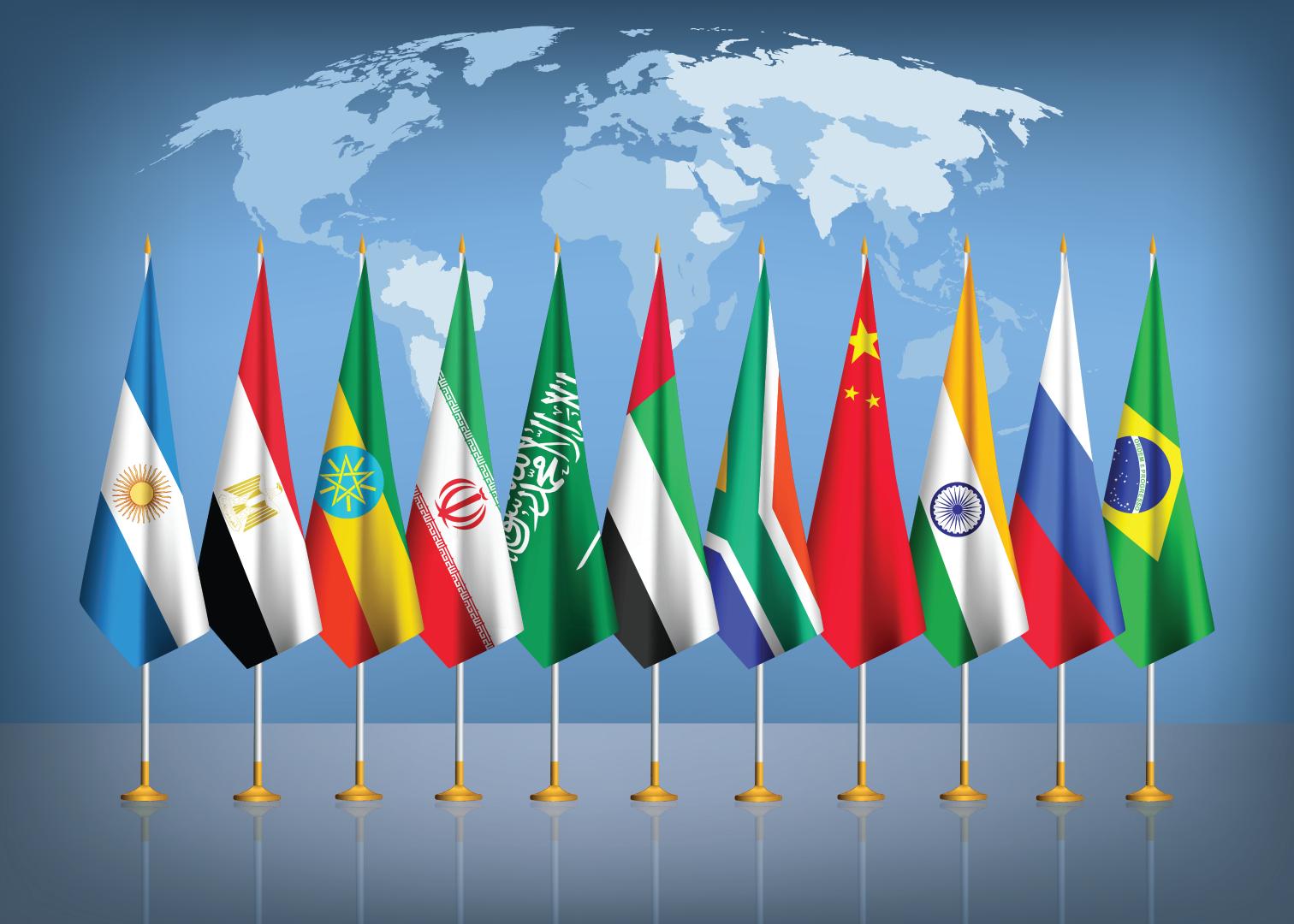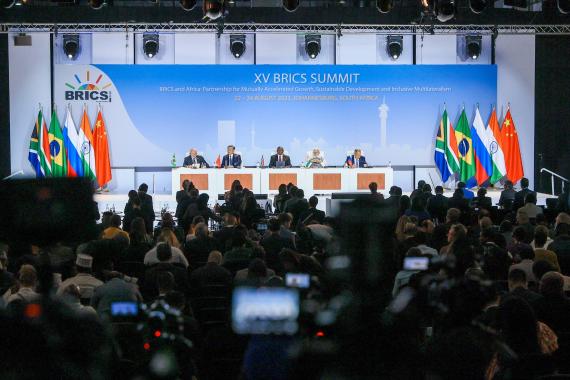Asset Publisher
BRICS expansion
Geopolitical power shift or transactional alliance?
Asset Publisher
The most important facts in brief
At its summit in August 2023, the BRICS alliance decided to expand by six countries as of January 2024. What does the inclusion of Iran, the United Arab Emirates, Saudi Arabia, Argentina, Egypt, and Ethiopia mean for the alliance's cohesion, economic power and geopolitical significance? How is "BRICS+" viewed in the various regions? And, above all, what conclusions should the EU and Germany draw from this?
Update 01.12.2023:
The future Foreign Minister of Argentina, Diana Mondino, announced on 30 November 2023 that Argentina will not join the BRICS alliance after all.
Table of contents
1. The BRICS
While the alliance of Brazil, Russia, India, China and South Africa, which was founded in 2009, had been relatively quiet in recent years, its XV summit in Johannesburg at the end of August brought it back into the global political spotlight. This was primarily for two reasons: firstly, because of the expansion of the alliance by six countries and secondly, because of the discussions about weakening or even replacing the US dollar as the world's reserve currency. With the inclusion of Iran, the United Arab Emirates, Saudi Arabia, Argentina, Egypt and Ethiopia as of January 2024, the BRICS group now represents around 36% of global gross national income (more than the G7, which stands at around 31%) and 46% of the world's population (G7: around 10%). More than 40% of global oil production and more than 36% of global gas production can now be attributed to BRICS countries.
2. How the world views BRICS+
The extended BRICS group of states tends to be seen worldwide as an anti-Western alliance. This view seems to dominate in many African countries, where BRICS+ is also occasionally seen as an anti-colonial alliance. The interpretation of the BRICS expansion seems to have something to do with how much a country feels it belongs to "the West": many European countries see the expansion as a turning away from Western hegemony, but not necessarily from the West as a whole; the USA sees the expanded alliance as nothing more than a "very diverse collection of countries", with some of which it even maintains close bilateral relationships (such as with India, Brazil or South Africa), which it would like to expand further. Numerous sub-Saharan African countries expressly welcome the enlargement because they see the alliance as an alternative for economic cooperation free from "Western constraints and interference", i.e. without being bound by ethical or normative standards. If not as a geopolitical counterweight, the expanded BRICS group is at least seen in many developing and emerging countries as an alternative model to the current world order and its institutions, which takes greater account of the interests of the "Global South". In particular, the "BRICS Bank", the New Development Bank, is seen as a financing alternative to the World Bank and the International Monetary Fund. However, the expansion is not seen as a geopolitical shift in power - if at all - or only by (political science) experts. The North Africa-Middle East region is an exception here.
3. ...and what follows from this?
While Asia is dominated by concerns about the formation of a stronger bloc, which could further increase the pressure to choose a side, in Latin America there are more interested to benevolent voices in favour of BRICS+: The latter from left-wing to socialist-governed countries, the former from countries with a definite "western" orientation such as Colombia, which (want to) see BRICS+ as an alliance for economic cooperation and hope to gain pragmatic access to economic cooperation and new sources of financing through possible membership. BRICS enlargement also means even more complex trade-offs in regional cooperation, e.g. in the Asia-Pacific region for countries such as Japan or Australia. Sub-Saharan Africa, on the other hand, primarily sees the opportunities that arise for the continent from enlargement: Alternative economic cooperation and investment opportunities, additional foreign policy options and the possibility to reshape the global order in the interests of Africa or the "Global South". The latter also predominates in the North Africa and Middle East region, where the BRICS expansion is most likely to be perceived as a geopolitical shift. In any case, BRICS enlargement is increasing the pressure on international organisations to reform and finally give developing and emerging countries adequate representation; the wake-up call should also have been heard in the EU - the Western Balkans are tired of waiting for EU accession and it cannot be ruled out that one or two countries will want to join BRICS+ in the medium term.
4. Will BRICS+ pick up speed?
The fact that two of the great strategic rivals of the African continent, Egypt and Ethiopia, as well as Saudi Arabia and Iran, the central adversaries of the Middle East, have joined the alliance, which already includes the "old arch-enemies" China and India, has often raised questions about the cohesion and resulting strength of the alliance. One exception here is Latin America, where the BRICS+ are sometimes considered to be more important than the G7. The question of the economic strength of the alliance is often a second reason why the future influence of BRICS+ is considered to be low. Egypt is not exactly one economic powerhouse; the Russian economy has been battered by the war against Ukraine and China is recording stagnating growth rates. – The latter could also have a negative impact on China's clear leadership role if it does not change. In any case, the ambitions of the BRICS+ to weaken the US dollar in the medium term or even replace it as the global reserve currency remain to be seen - even if this is still unrealistic at present. If BRICS+ is successful in this endeavour, it could result in fundamental changes to the global financial architecture.
5. Conclusion
The BRICS expansion has raised hopes, particularly in developing and emerging countries: for a greater say for the countries of the "Global South", including a reorganisation of the global order in their interests, for new options for economic cooperation and sources of financing "without strings attached" and, overall, for a reduction in dependency on and influence by the "Western partners".
Whether these hopes can be fulfilled depends firstly on whether BRICS+ can get to grips with the obvious challenges: the political and social conditions in the potential eleven member states are very diverse, relations between the countries are sometimes characterised by foreign policy tensions and even tangible rivalries, and there can be no talk of a unifying "value superstructure" - unless principles such as "non-interference in internal affairs" or economic pragmatism are already regarded as a "unifying ideology". There is also the question of the economic strength of the alliance as a whole in view of the economic problems of some member countries - not least China. It remains to be seen whether the expanded BRICS alliance will be able to formulate common goals or coordinate a united approach to certain (global political) points of contention against the backdrop of this mixed situation. It also remains to be seen whether these challenges outweigh the undeniably strong symbolic character of the alliance's expansion and the increased self-confidence of many developing and emerging countries that came with it.
On the other hand, the question of whether BRICS+ will become a success story cannot be viewed entirely independently of the actions of the "Western countries". Is the EU's Global Gateway initiative gaining momentum and becoming a popular "brand" with old and new partners? How is the accession process in the Western Balkans progressing? What influence will the outcome of the US elections have on US foreign policy? Will Europe and the USA turn up their diplomatic noses because a country - e.g. Argentina - is about to join BRICS, or will they instead try to be "the better partner" by approaching the country with customised offers? - It should also be noted here that when it comes to Germany's cooperation with BRICS member states, it probably makes sense to differentiate between countries with a clearly anti-Western agenda and those that are pragmatically looking for new trading partners and opportunities for cooperation.
What can be stated with certainty is that the BRICS expansion marks a further step towards a multipolar world - and therefore also towards a new global order, even if it is still unclear who will call the tune in this.







